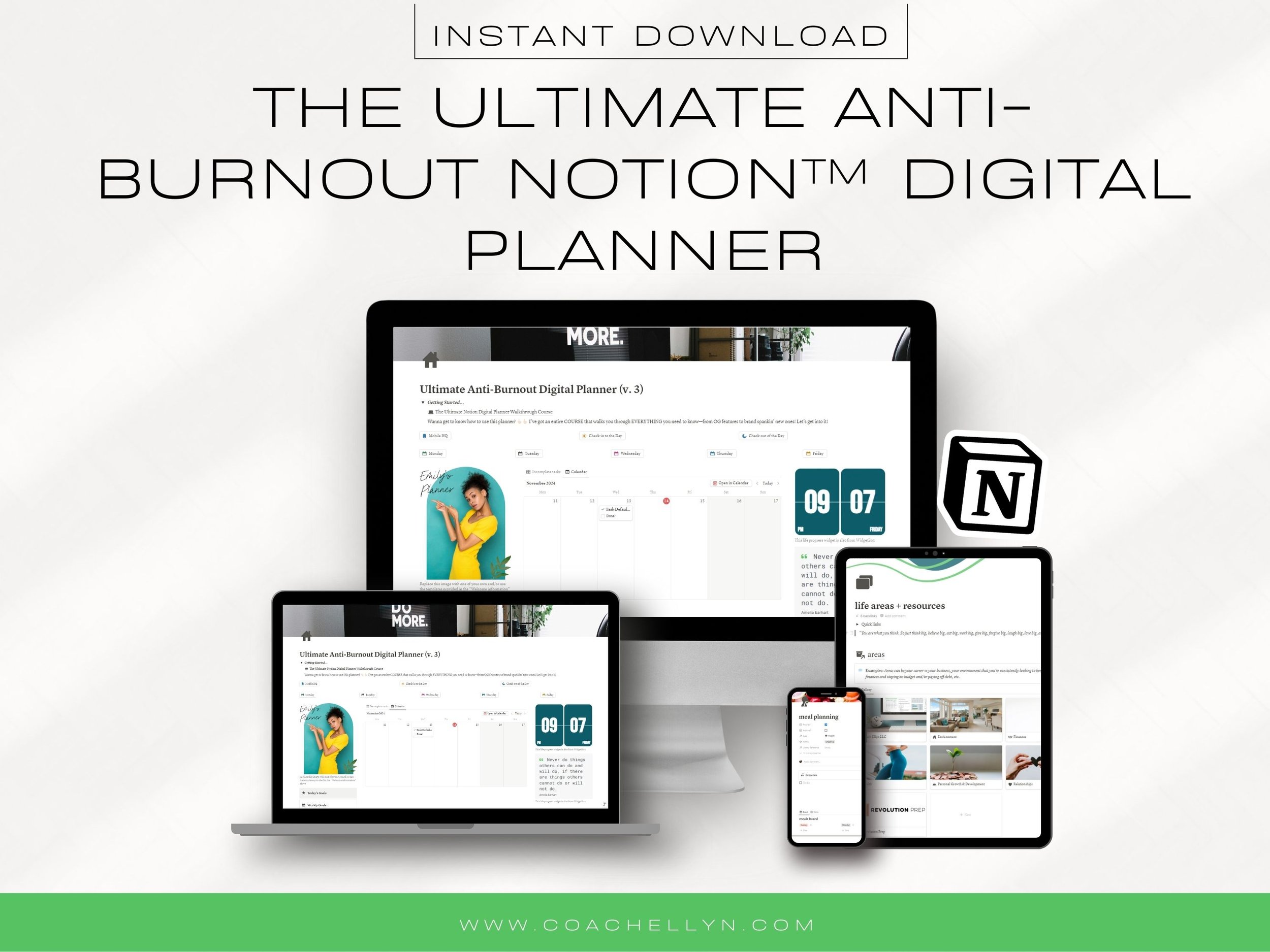Your Burnout Type...
You’re OVERWHELMED, my friend!
(bookmark this page!)
Your life? It's one big to-do list...and you can NEVER escape from it. You're drowning in tasks, to-dos, and responsibilities...
It's a completely different feeling. It's the productivity side of the burnout monster. And as such, it requires a completely different fix then the other types of burnout do...
So, let’s get into it...
Overwhelm resources…
Time-crunched? Over-scheduled? Too many demands and not enough time? Yup - that sounds about right. You, my friend, are overwhelmed AF.
I was reading a CareerWise article that described overwhelm as “if I can just get everything under control, it will be okay”, while describing burnout as “I don’t see any hope of getting things under control.” I disagree. Overwhelm burnout makes you feel like you’re drowning in your tasks, to-dos, and responsibilities is burnout. I’ve also heard burnout described by productivity expert Tonya Dalton in the book The Joy of Missing Out as not necessarily having too much to do, but instead not knowing where to start. So, basically, it’s damn important that we differentiate it from the other types of burnout because it is going to require a different fix
Signs of overwhelm burnout
Ever curveball feels like a major crisis that throws you into a spiral. Does your plate feel so overloaded that even the slightest added task or bump in the road isn’t going to be manageable? Are you so stressed that you’re finding your emotions are on a hair-trigger? Yup. You’re overwhelmed AF, my friend.
Feeling like you have too many demands in your work. This refers to the non-negotiable aspects of your job. The parts require active effort and energy, and sometimes you just don’t have enough bandwidth to give these demands what they require.
Feeling like you never have time for your life or yourself. This likely is a result of working too much not having enough time for socializing or play. But sometimes, it can mean you’re just overscheduled by your own doing. Maybe you've overscheduled your social life and aren’t getting enough alone time to rejuvenate yourself.
Being over-engaged in your work. Are you constantly plugged in? Constantly available? Do you believe so wholeheartedly in inbox zero that you never even close yours? You my friend are on the way to overwhelm burnout. Now, yes, this isn’t the classic burnout that results in emotional and physical exhaustion, but it can definitely send you on the way.
Things to try to overcome overwhelm burnout.
Breakdown your work into small tasks. A big part of overwhelm burnout I’ve struggled with in the past is just feeling the sheer overwhelm of not knowing where to start. Whether it’s a personal goal or a work project, getting started can be the most daunting part. Do yourself a favor and brainstorm all the action steps needed and schedule those action steps into your day-to-day. This gives you an easy-to-tackle action step each day. Decision fatigue is real so if you make all those decisions up front - as best as possible - you’ll help yourself circumnavigate this aspect of overwhelm. I detail more of this in my “Goal Mapping” webinar here >>
Don’t worry about things you can’t control. A big part of overwhelm for high-achievers is seeking control. But here’s the long-and-short of it - you can’t control everything. You can’t control traffic. You can’t control someone not reaching back out to you when you want them to. You can’t control the coworker or superior who reaches out to you late on Friday to get some extra work done. You can’t control the weather. None of it. But you can control your response to it - your emotional response and whether you’re saying “yes” or “no”. That’s all you can control. You compulsion to control more than that? Your frustration when people and situations don’t meet your carefully crafted expectations? Who is that harming here, my friend? Y.O.U. You’ve got enough on your plate. Let some of this shit go, okay? Trust me. You’ll thank me.
Put away your smartphone. If you’re overwhelmed already, the last thing you need is more stimulation. And that smartphone you’re attached to? It’s a stimulation machine. Notifications? Emails? Texts? Phone calls? It’s literally stimulation, to-do, and task after task that are flooding your brain one second after another. Your overwhelm is already real, my friend. So, I implore you - set some massive boundaries with your smartphone. Dont’ feel the need to respond to every text and email that comes in right away if you already feel like you can’t take breath. Stop enslaving yourself to the bells and whistles coming from that little electronic box. The people sending them? They can wait. You’re more important. Here are some great smartphone boundaries to set to cut down on overwhelm:
Morning “phone-free” time. When are you allowed to get on your phone/social media each day?
Evening “phone-free”time. When are you “no longer available” via your phone/social media?
Phone-free days. How often are you scheduling them? Cuz digital detoxes are healthy and we could all be better about them…
Prioritizing your tasks from the get-go. The Eisenhower-priority matrix is a great way to distinguish priorities. Shown above, this matrix helps you sepaarte your tasks into the things that are truly important (ie. self-care, personal growth, time off, etc.) vs. those things that are urgent (urgent to-dos, emails, etc.). This is helpful because you can then build your to-do list and your days of the week.
Expanding your job resources. If you’re particularly struggling with having too many work demands, you might have a mismatch between your demands and your resources. Can you expand your support staff? Can you leverage new systems? Can you learn new skills to enhance your productivity and effectiveness (or utilize the skills of others)?
Say “no” to additional, extra work. Yes, of course, do your job. I’m not telling you to shirk your responsibilities. But you’re already stretched thing, so tell the people-pleaser in you to STFU - you don’t have the bandwidth to take more on. This includes social commitments and responsibilites outside of work. If there are responsibilities that are yours, communicate your overwhelm to your superiors and see if there’s something that you can delegate. Because - trust me - no amount of financial compensation is worth what you’re doing to yourself.
Try meditation or yoga. People who struggle with overwhelm need to do one very important thing - slow down. Meditation and yoga might feel like the last things you want to do - another to-do list item to add to your already overwhelmed life - but that’s exactly what they force you to do: breathe, slow down, and calm yourself.
Create a mantra or trigger phrase. When you catch yourself going into overwhelm or catastrophizing thinking, sometimes we just need something to pull us out of our mental spiral. A good way to do this is to create a sort of trigger phrase to remind yourself that spiraling isn’t productive. My advice? Keep it neutral and non-judgmental. Something like: “Okay, I’m starting to spiral. I can figure this out though, so I’m going to take a break until I do.”
IS YOUR ORGANIZATION OVERWHELMED?
Organizational overwhelm is a serious problem in today’s age of burnout. And make no mistake, if you’re overwhelmed and you’re a leader in your organization, your people probably are too. There’s a trickle-down effect that inevitably happens. Here’s how you can help…
Make priorities clear. When we’re in overwhelm, making decisions about where to start can be challenging. Help our your team and direct reports by making priorities super clear.
Be an effective communicator/delegator. If you’re handing out tasks, projects, and clients to your team or those who report to you, make sure you’re communicating clearly and effectively—and in multiple modalities. Simply telling someone something might not work for all your team members because not all of us are auditory. I personally work best when I can see and read, so I appreciate email and text communication because that’s how I take in information. Best practice? Cover all your bases. Tell them. Show them a slide. Send a follow-up email. Cover all your bases so you’re meeting your team where they’re at and so nothing falls through the cracks.
Leverage my Weekly Review for more effective 1-on-1s. To help get clear on the sources of overwhelm and how you can best support your team, I highly recommend using my weekly review format to have more effective 1-on-1s. Ask your direct reports these 3 simple, but powerful questions: What’s going well? What’s not going well? What’s stressing you out right now? Pro tip: Have them answer these questions before the meeting starts and use the answers to frame your conversations and areas of focus.
Set boundaries FOR your team. It’s harder the lower you are in the chain to set boundaries with the higher-ups and superiors. Do your team a favor and set boundaries for them. Vouch for them. If they’re already overcommited, don’t take on more no matter what positive benefits you might think there are.
Questions/journal prompts to think about:
Right now, I feel the most challenged by ________ and the most supported when _________.
What thoughts do I frequently have when I feel overwhelmed? How do they keep you stuck? What benefit are they providing you?
What does my overhwhelm and breakdown cycle look like and how can I circumvent it?
What overwhelming thoughts do I choose and how can I avoid choosing them?
What comforting things do I distract myself with when I’m overwhelmed? Can I choose some better options?
What do I want to feel instead of overwhelmed and how can I choose that over overwhelm?
What thoughts or behaviors do I need to change to avoid feeling so overwhelmed?
What am I going to choose instead of my overwhelm cycle?
What process(es) do I need to simplify and how can I do so?
In moments when my overwhelm is unavoidable, how can I support myself through this?
Are there any limiting beliefs I need to let go of to overcome and avoid my current overwhelm?
Other things to try/consider:
Work with a coach to give you accountability in navigating your overwhelm. You’ll also get personalized recommendations and support. Apply for a call here >>
podcasts to listen to:
“Airplane Mentality & Why You must Put Your Oxygen Mask On First” - here
“Dolce far Niente: Taking a Page from EAT PRAY LOVE” - here
“5 Things to STOP DOING to TAKE BACK YOUR LIFE” - here
“3 Tips to Help You WORK LESS + LIVE MORE” - here














